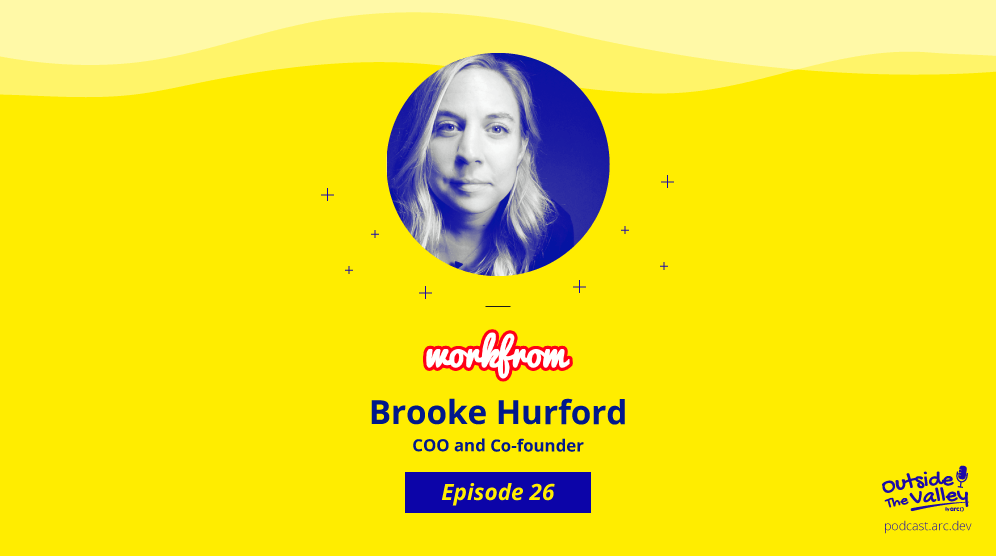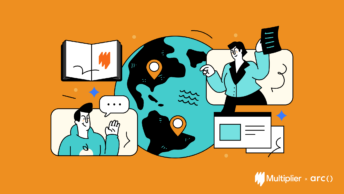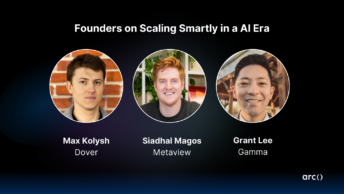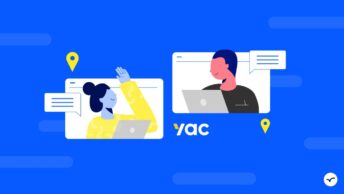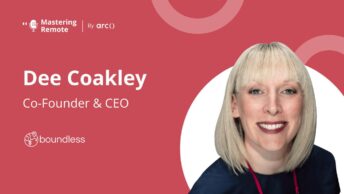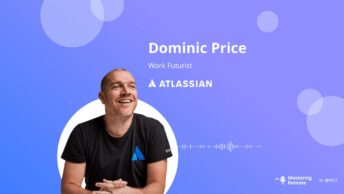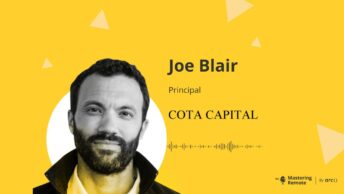Who works at the same places I like to work? What are the other remote workers in my city? How do I find other remote workers around? There’s no connective tissue.
For this week’s episode, we have Brooke Hurford, COO and co-founder of Workfrom, a platform connecting professionals to real-world spaces and virtual offices. We talked about how Workfrom is designed to help remote workers interact better, the benefits of remote work to local communities, how Techstars mentorship helped her and her co-founder, and more.
If you’ve enjoyed this episode, please consider leaving a review on iTunes!
The podcast is also available on your favourite players: iTunes, Google Podcast, Castro, Overcast, Spotify, Stitcher, Player.fm, and Tune In.
Follow us on Twitter to get updates.
Looking for top talent fast? See how Arc can help you:
⚡️ Find developers, designers, marketers, and more
⚡️ Freelance or full-time remote + fully vetted
⚡️ Save up to 80% with global hires
Hire top talent with Arc risk-free →
Topics also covered in this episode:
- Why Brooke was initially attracted to remote work
- Brooke’s experiences with isolation while working remotely
- How Workfrom helps remote workers to interact with each other
- How Brooke thinks COVID-19 will impact the dynamics of remote work in the future
- Why remote work is a big benefit to local communities
Mentioned resources:
Full transcript:
Jovian: Welcome to another episode of “Outside the Valley” a podcast by Arc. Here we interview remote startup leaders, remote work advocates, and workers of distributed teams who thrive outside of Silicon Valley. I’m your host, Jovian Gautama. Today we’re going to talk about the role of communities, spaces, and camaraderie amongst remote workers all around the world with the co-founder and COO of an up and rising startup Workfrom.
Workfrom itself is a platform connecting professionals to real-world spaces and virtual offices where they can be productive outside the home or office. Basically like a third space. They’re also the world’s largest search engine for worker spaces and community of mobile workers. And this year they were also invited to Techstars Anywhere, a brand new remote accelerator program launched by Techstars. Super excited to have our guest here today, Brooke Hurford. Brooke, thanks for being here.
Brooke: Thank you so much for having me. I’m excited.
Jovian: Yeah, super excited to talk about you because the topic around your community and remote workers interact with each other is something that I’m always interested in. So I’d love to chat. So before I start the whole thing, I’d like to chat a bit about yourself and how you joined and founded Workfrom.
Brooke: Yeah, definitely. So, I found Workfrom in 2016. I had previously for the five years before that I had been a project manager at a web development agency here in Portland, agency. I loved the tech industry. I didn’t love being kind of outside all of the creative work being done. So I decided I wanted to go to a coding school for front-end web development. It was a six-month program 40-hours a week, really intense.
And at the end of that, I had an internship. I applied for five, Workfrom was one of them and ended up getting chosen to be a Workfrom intern. And so that’s how I started. Lucky for me, they decided to hire me after that. So I worked as a front-end developer for about a year. At Workfrom, when it kind of the team, you know, things were happening and it ended up to be Darren, the original founder, and myself on the team.
And I just, you know, if I decided, after working with him, I knew that if I was gonna work on a startup, building a startup it was to be with him, I just love working with him. And so, yeah, that’s kind of how I came to be co-founder of Workfrom.
Jovian: And how big is the team now?
Brooke: So, the team is five people.
Jovian: Right. Some people will argue this is the best time in startups when you’re small. Because when you get bigger, like 20 people, especially like the founders. I’ve talked to a couple of people in the podcast, they basically kind of miss those time when their startup was smaller. It’s just because things move faster. But again, going big doesn’t mean it’s bad. It just means there’s more process to be done. And so, yeah. But I’m quite curious, is Workfrom your first remote job?
Brooke: It is, so, Workfrom’s my first remote job. But there was a time where I wasn’t full time at Workfrom so I ended up doing… I was freelancing as well. I did freelance web development and worked on Workfrom kind of on the side, but at least I was always working on it at least half of my time.
And then to support myself in the beginning, I would do freelancing, and I was also, that’s when I started traveling and working as well. So I have experience working with clients remotely, as well as working at Workfrom remotely.
Jovian: Got it. Just curious, what specifically attracted you to the whole remote work thing?
Brooke: Oh, man. So, freedom. I was like most people worked a 9:00 to 5:00. You have to be at this office every day. If you don’t come in, that’s kind of… what’s happening. Why are you slacking? I don’t know, it was very much that vibe. So, when I learned about remote work and the fact that you could choose where you want, it just completely blew my mind. I didn’t realize it was possible.
So when I went to coding school I thought, if I could become a developer, sometime in my life I can work remotely, and it just all happened. That’s why I was so stoked to be, you know, able to work at Workfrom in the beginning because I thought it was gonna take me a lot longer to achieve that remote status. But, yeah, it’s definitely the freedom to choose your lifestyle and have it be more about what you want versus what somebody is telling you what time and where you have to be.
Jovian: Yeah, and you’re now like really in the center of it. You really founded a remote work company so-to-speak. Like a company that revolves around the whole remote work thing. So, tell me a bit through the Workfrom, especially for listeners who are not familiar, what is Workfrom and what’s the concept of it?
Brooke: Yeah, so Workfrom in the very beginning served one main purpose, which is to help you find places to work, and ended up being a lot of coffee shops, so places to… Yeah, places to work like coffee shops, libraries, co-working spaces, literally any place with Wi-Fi. So people have put campsites on there. So it’s basically it was like, “This is where I’m at. I need a place to go right now and I’m going to be in Taipei.” And then you can see places based on like their Wi-Fi speeds, if there’s plugins, if it’s noisy, what the pictures are like, reviews. So that’s very much how it was born.
And over the years, we started asking people, why did you sign up and as soon as they did. And everybody was super lonely, basically. They were like, “I work at home all the time. And I wanna get out of the house.” So, literally, it was finding a place, but motivation was this isolation that we can all talk about and are experiencing at least sometimes when we work remotely. So that’s how it’s evolving, is to solve that.
A lot of people would say, I like going to places around, I love to know the people that are around, you know
Who works at the same places I like to work? What are the other remote workers in my city? How do I find other remote workers around? There’s no connective tissue.
And so that’s future vision of Workfrom. So, started finding places and you can still do that, but what we’re doing through Techstars is figuring out exactly how to help people connect more in the ways that they want to.
Jovian: Got it. I just want to dive into this a little bit, especially in the topic of isolation actually. So, as we’re recording this, you know that the whole world is currently having somewhat “forced” to do, you know, the so-called work from home and remote work. And you see in the social media, there’s a lot of sentiments of people starting to feel isolated, like having a cabin fever, and so on, so. This is something that probably people didn’t expect when it comes to remote work, especially for me. I’m also a remote worker. People will say, “Oh, the freedom, or you can work from anywhere, and you can schedule your stuff. If you want to work on weekends and take the day off on weekdays, it’s okay,” something like that.
But the isolation aspect is actually quite, you know, it’s sometimes it’s rarely talked about compared to the other productivity talk, you know, four-hour work week talk. I’m curious, what’s your experience with isolation?
Brooke: Yeah, so, definitely. So my experience with isolation is what… So I started working remotely. And I think, to your point about people not talking about as much is because we’re, like, when Darren and I always say, we’re remote drunk. And I think people that are really into remote are just so into it. You don’t really wanna talk about the negatives because there are so many positives.
Jovian: Absolutely.
Brooke: But everything has give and take. And so if we are so gung ho and positive about remote work and isolation is a side effect, let’s just work on fixing that instead of having to choose one or the other. My experience is I worked remotely only for a few months before I started traveling. And what I did was I worked with co-working and co-living groups. So I went on those kind of month-long trips where basically you live with other people from all over the world. And that really was, I never felt isolated or lonely. I heard people talk about that in remote work, but I never experienced it until I came back to my hometown and I was in Portland for about a year. And I was like, realized everybody was talking about.
I was working at home all the time. I wasn’t intentional about human connection. I just was kind of like, got into my workflow. And then a couple of weeks have gone by, I hadn’t seen any friends. I really started to just notice the effects and kind of understand more of what people are feeling. And that’s when I just realized how intentional you have to be.
So if you choose this work style and if you choose for your home to be your office, you really have to be intentionable…
Jovian: Intentional I think is what you… Yeah.
Brooke: Intentional about getting what you need as far as human connection is considered.
Jovian: That’s an interesting point you make, because the word intentional or intentionable, I’m sorry. It came a lot in my conversation with other people when it comes to remote work. It’s not only in the personal level, but only the company level. Like, you’ve got to be intentional about onboarding, hiring, taking care of your remote employees, and so on. So, with this in mind, you talk about being intentional with social interaction. How does Workfrom helps a user achieve that? Or what kind of features that actually came from this particular mindset of yours and Darren’s, your co-founder, that, “Oh, we have to be intentional when it comes to social connection.” How do you translate it to features in the Wordfrom?
Brooke: Yeah, definitely. So we are pre-launched with our beta for this. But the features when we were thinking about them are very like, okay, so you have connection that’s similar like Tinder. Where you’re just like one-on-one like you should meet, like go on a date. But the one thing we realized is that people have different level of connections that they’re comfortable with.
Some people say a Slack community. You just like to observe. You’re interested in what’s going on, you don’t necessarily wanna…you’re not the extrovert that’s gonna be just jumping in right away. So I think that’s a big thing, is like,
[…]what we’re launching, we’re trying to have different features where you can choose the level of connection you want anywhere from being an observer to a straight-up one-on-one connection. And that’s kind of how I think about it. It’s like the layers of people to be able to choose what they want because everybody’s different, but giving everyone the opportunity to feel connected in whatever that means to them.
Jovian: Yeah, and the thing is really people’s… I think a lot of, my take on it is also like, or my hypotheses on this, like a lot of online communities often thrive because of this particular needs. It’s not necessarily about remote workers community but just our communities, like Facebook groups, or even familiar with indie hackers lots of entrepreneurs. I think they just try to find some connections online just like Tinder that you said about, talked about it. But yeah, I think it’s a very basic human need.
Brooke: It definitely is. It’s like we’re all humans like it’s different now, the world is shifting. We’re on our computers, it’s tech space. Now it’s exciting to see everybody so quick and ready to jump on video call because I think that is so important. And I’m sure you’ve experienced this in a remote team. You have to be on video call so you can kind of feel that. But I think just that human part of it and that we’re even though it’s like these online communities of typing and chatting, we’re all humans behind the computer.
Jovian: Yeah, got it.
Brooke: So, yeah, bringing that out.
Jovian: You mentioned you’ve been joining Workfrom since 2016, right?
Brooke: Mm-hmm.
Jovian: You’ve been working… In these four years, is there anything that you’ve learned in regards to remote work that kind of changed your perspective on it? Like before you started working at Workfrom it was like that, but now it was different.
Brooke: Yeah. So I think the biggest thing is that remote work is not any one thing. I think when I was excited about it, for me, it was the whole digital nomad thing.
Jovian: Absolutely.
Brooke: I was like, “I’m gonna be a remote worker. I’m gonna travel every month. I’m gonna eat out.” And I thought Workfrom, cool. It’s this huge community of digital nomads and travelers. And one thing I learned, that’s not our community.
Our community is 80% at least employees of remote companies that live in their own city, that work at home at least three to four days a week.
So it’s like, that’s one huge thing I learned.
And then just talking to all the different people and how, why remote work is important to them. Whether you have kids, whether you have families, think like everybody has different reasons. And I think just learning about all those different aspects has been eye-opening. And from what I came into it thinking remote work was this one specific thing and now I just remote work is being able to design your work in however you want.
Jovian: It is a spectrum definitely.
Brooke: Yes. Very much a spectrum.
Jovian: Yeah. And I also like your point about digital nomad because I think for companies that are not familiar with remote work, that’s their first, that’s their very first, their typical idea of a remote worker. Are you working from the beach? Like the beach doesn’t have Wi-Fi. So, that was kind of like, and actually our founder, Weiting, also wrote about this on Forbes. Basically like, not every remote workers are digital nomads.
Brooke: [inaudible 00:13:51] yeah.
Jovian: I forgot who said that, I think someone said it on Twitter, like, it’s probably like digital stay-mads, like even if they move, they’ll probably be in Mexico for three months or in Korea for three months.
Brooke: Yeah, 100%. I think for that first year I was just figuring it out month-to-month. But since then I’ll still travel quite a bit but it’s three months in one place. It’s still figuring out what works for you. But, yeah, I agree, there’s this stereotype that remote work means digital nomad or it means work from home and never leave. And I just think it’s a spectrum, 100%.
Jovian: Yeah, I mean, I’ve seen companies like that they feel like remote workers. “Oh, what if they have like shitty internet?” Something like that. So, that’s something that we need to change on this, like this kind of perspective.
Brooke: Yeah, you know, and trust in the unknown and people who’ve never done it. And never been on a team and just there’s so many things that people have questions on. And until you experience it’s kind of…
Jovian: Got it. Cool. So, Workfrom is invited to the Techstars Accelerator, Techstars Anywhere, can you share, and congratulations by the way.
Brooke: Thank you.
Jovian: Yeah, I’d love to chat a bit more on the decision to join Techstars, and why do you think it’s the right step for Workfrom?
Brooke: Oh, man. So, by far just the most amazing thing to be a part of. It was the right choice for Workfrom. There’s this crazy network of mentors of people that I just didn’t have on my own, you know, people that I consider just so successful that are just willing to help me now and I love that are… So, our cohort and all the Techstars’ cohorts are only 10 companies. And we have a managing director and two other Techstars staff that just work with our 10 companies.
Jovian: Got it.
Brooke: So, yeah, just the amount of help, the way they’ve pushed us, it’s like this business. I never went to a business school. I got my Associate of Arts and then got into tech by way of that. And I just didn’t have these kinds of fundamentals of business that Techstars is teaching me. We have workshops all the time with just incredibly smart people.
And so, like I said, yeah, they’ve just pushed us in a way that I’ve never personally been pushed before. And, you know, for the better. It’s been really awesome. The camaraderie of the cohort, the other companies are just so freaking cool. And, yeah, it just was the perfect I think the exact place for Workfrom and where we need to be as a company right now.
Jovian: Got it. Was the main attraction for you and your co-founder to join Techstars was because the….is it like a remote cohort like Techstars Anywhere?
Brooke: Yeah.
Jovian: I think it’s the first cohort, right? It’s their first…?
Brooke: No, we’re fourth actually.
Jovian: Oh, sorry.
Brooke: Yeah, no, no, you’re good. It’s newer, but yeah, this is the fourth cohort they’ve done of the Anywhere program, but it is newer. Forever Techstars has been an in-person accelerator all over the world. So right now there’s currently 14 cohorts happening.
Jovian: Got it.
Brooke: 10 companies, but, yeah, all over the world. And then this is the only remote cohort happening.
Jovian: Got it. Got it. But not every companies joined are related to remote work. It’s basically just the fact that you don’t have an office so-to-speak.
Brooke: Yeah, correct. So a lot of us are remote-focused, or at least that’s part of our market but definitely not. Definitely not all of it. It’s not a requirement by any means.
Jovian: Got it. So, the Techstars Accelerator itself is basically just normal accelerator but everything is done remotely. Is that correct?
Brooke: I’ve never been through another accelerator, so, yeah, I don’t…
Jovian: Okay. Can you share a bit more about how does it work, especially when remotely. Because actually, you know, Arc is affiliated with Codementor, which is also a company that our founder founded. Which still exists this founder, we kind of like work together we share the same office right now. Codementor is a Techstars Seattle graduate.
Brooke: Oh nice.
Jovian: Yes, so it’s interesting like the big…Actually it’s like you mentioned. One of the biggest things about Techstars is the mentorship part of it, right?
Brooke: Mm-hmm.
Jovian: Which is, you know, you got to hang out with these great mentors. And then you can hang out with like-minded people on the same cohort. And that’s the biggest value. So I’m just curious, if you can share a bit, in the Techstars, how does, because in remote like you mentioned, back to the intentionality of this stuff. While in your co-located accelerator, you can just hang out like at lunch you talk and you start talking shop. But can you share a bit more, what’s the biggest thing that you’ve kind of experienced during the accelerator, and said, “Yep, this is it.”
Brooke: Yeah. Definitely, so, it’s a good point because I think even what we’re bringing into the future for Workfrom, I’ve learned a lot from our managing directors Ryan Cooter and also Kendra Dixon. And the way they manage this program and just noticing the intentional things they do to make sure we get the same experience.
So, it’s 13 weeks and we have three trips. So we started the program off. We had never met…I think we’ve done one video call with all the companies just to kind of see, it was kind of see who else was in it. We didn’t know before that.
Jovian: Interesting.
Brooke: And then we all flew down to San Diego and met for a week. And we stayed in a house with at least three of the other companies and then every day for like 14 hours we would go to a house and basically like, “This is Techstars meeting friends.” We did workshops on just the company basics, but also a lot of bonding inducing workshops, like, you know, walk and talks with each other.
And they did founder stories where they sit and tell us their personal stories. And are super vulnerable and just make it a space for us all to put those walls down you have when you’re just meeting a bunch of new people. And so coming out of that week was like, “I’ve got a bunch of homies now.” Like I just felt very comfortable with everybody it was like, you know, we’re voice messaging each other, we’re slack, like it just…they did a great job of making it a space to start off and be like, “Okay, now we’re all in this together.”
Basically that we’re in this together. So then we come to our prospective homes, and we started doing a bunch of workshops. So we do those all online. We are always asking each other how we feel. It’s a very open communicating environment. And then as far as the process from there we did for mentors. I think a cool thing that I didn’t know before was, we did two weeks of mentor madness.
So, for over a two-week period, we had 80 meetings with all these different mentors, 20 minutes where we pitched and talk to them. And then at the end, we picked three mentors that we meet with weekly for the rest of the program. And then also you can really reach out to any of the mentors at any time but that was kind of the process for picking who you vibed with, who was helpful, who got your vision, all that kind of stuff. And then we had a second trip in Boulder again where we all just kind of went and stayed in houses. But, like I said, it’s just an environment that they, I think, intentionally create for us all to feel comfortable digitally being friends while we’re not all together.
Jovian: Yeah, and it’s a gigantic task, isn’t it? In any environment, to create an environment where…We create a remote environment where people belong in the same, you know, belong in the same, we’re in this together vibe is really hard, isn’t it?
Brooke: Yeah, it is. And you don’t really realize it until you see it being done. “Wow, they made me feel like they recreated this kind of in-person experience,” other things that [inaudible 00:21:55] that way, but we’re not personal, and so, yeah.
Jovian: The funny thing, you mentioned about the mentor madness thing. I think it’s also something that they do in a co-located cohort. But the fact that they can’t translate it to, in the remote setting very smoothly is actually pretty great, right?
Brooke: Yeah. No, it was great. So, Darren and I were in the same house but different rooms.
Jovian: Oh, I see.
Brooke: And we’d meet 20 minutes and we had five-minute breaks in between. It was just this fast-paced like, “Oh my God, they’re cool,” like rundown. Like, “I love them.” And he was like, I would. And then I don’t know. So, yeah, it was like Zoom call to Zoom call, but the experience of it was still eventful and big.
Jovian: Yeah. Got it. So, I want to shift gears a bit about the current situation about, we are currently facing a challenging time due to the Coronavirus pandemic causing a lot of companies and employees to start “experimenting” with remote work or working from home like WFH is very popular. Three word acronyms nowadays in social media is for the first time. Curious about your take on this. Do you think this will make remote work be more popular in the near future? Or how do you think it’ll impact the dynamic of the remote community, even the Workfrom community?
Brooke: Yes, so, as far as making remote work more pop…I think it’ll be more understood. I don’t know if this is gonna make companies that were completely closed-minded to remote say, “Oh, hell, yeah, we’re gonna be remote now.” But I think it’ll show people the possibilities. Like maybe not everything has to be in-person, maybe it is okay for people to work from home every once. You know, I think it’s just gonna open people’s eyes a little, maybe open their minds a bit more than it did.
And I think it’ll also…I have a friend who works at a finance company, and he was talking about how they’re 90% remote already, they were prepared for it and then their competitor was not, and so they’re still struggling to make this transition during what’s happening. And so I think it’ll make people have those contingency plans. And then also, yeah, be a little bit more open to the remote work style in general. Maybe not being a fully distributed company.
Jovian: Yeah, it’s tough.
Brooke: I think that’s what will happen. But, yeah, also, I think maybe before we were recording I mentioned, what’s happening now is not definitely my normal work style.
Jovian: Absolutely.
Brooke: Like being stuck at home. I haven’t been able to leave. Like, I’m a coffee shop girl, it’s definitely different. And I think for people to kind of…I think if people say, I think, “This is remote work,” might not have the best experience with it too. So, that’s another thing I’ve been observing.
Jovian: Yeah, absolutely. I’m actually similar to you, like I’m a coffee shop kind of person. That’s my idea of remote work, is not confined at home, especially for people with families, because, whereas even for the usual parents who work from home, they usually work without their kids around because kids aren’t going to school. But now the kids are home. So that’s just like a different level, different kind of remote work, so it’s solely. I can see your face like very like, “Oh, yeah.”
Brooke: Yeah, I don’t have kids, but our Slack community that has been a very popular topic, just the [inaudible 00:25:20] And then my co-founder, Darren, he has a two-year-old. There’s other people, you know, a lot of people in our Slack community have kids and it’s just something that people have been talking about a lot.
Jovian: Yeah, it is super hard. I want to talk. So this is something I forgot to ask before. So it’s about the…What do you think is Workfrom’s role in regards to helping the local economies to thrive? Because people are working from coffee shops, or local restaurants, or something like that.
So, I think this is also a topic that I’m super interested about, like how remote work can boost the local economies, especially in smaller cities. So, I’m curious, what’s Workfrom’s role is or if you guys have a plan to kind of like in this area, you know, and partnering up. I’ve seen you guys already partnering up with vendors or venues.
Brooke: Yes. So, as far as helping local economies, I definitely think Workfrom has a role to play. A lot of people that work at home don’t realize that there are workable spaces around them, you know, coffee shops, small co-working restaurants, all that kind of stuff. Yes, I think, and just, I was gonna say, oh, Grow Remote, Ireland. I don’t know if you’ve heard of it, but they are huge and one of the biggest initiatives that I’ve seen of like, “Let’s bring remote workers to more rural communities.” So they work heavily in Ireland and just getting the workers and spreading out, I don’t know if the wealth is the right term, but having people that can make good money that don’t have to be just in Dublin or just in these main cities and taking it these rural areas and having remote workers there that are making good salaries, supporting their local communities, that’s always really fun to learn about and see people doing.
Jovian: Yeah. And also there are a lot of a similar initiatives like Tulsa Remote, I guess. And also I talked to Laurel Farrer remote work consultant. You know Laurel?
Brooke: Yes.
Jovian: So, yeah, she was experienced in helping rural areas to do this kind of, helping them grow and helping their local workers to get remote jobs. So, I always find that interesting aspect of remote works that like a second-degree effect of remote work that I think more and more people will talk, especially in this current situation, current crisis of the pandemic where we are now…We now realize more than ever the role of the local small businesses.
Brooke: Yeah, definitely. And just the points like kind of that extension of people should be able to be where they want. If they wanna be tied to it just because they can’t get the job that they want. So it’s just another extension of that I think, too.
Jovian: Yeah, especially. I think that’s also the main…this is the main thing that we believe here in Arc. We’re a platform where you can hire, sorry. We’re a platform where you can hire software engineers. But we do believe that if you have the talent and the skills, you don’t have to be confined to your geographical limitation. You can be in Asia or you can be in Europe or Eastern Europe, and you can work with great companies based in Silicon Valley, Seattle, Portland or anywhere. So I think…
Brooke: And I think just how you said that about local community. So I think it was Andreas Klinger. He had a tweet one time that said, “If work is remote, life should be local.” And I think it always stuck out to me and that is part of the vision of what we’ll be launching because of COVID and everything we’re strictly focusing on virtual tools first. But the idea is that once we are going back to the places we love, and just because our team is all over the world, and maybe for me wouldn’t be in Portland, there’s still local co-workers, local remote workers to create that sense of local community, local business. There’s still a role that localness has to play even if you do flexible. Yeah, I think that’s an interesting thing too.
Jovian: Yeah. I saw that tweet, too. I think I retweeted that. I absolutely agree with that, the sentiment.
Brooke: Like damn it, that’s so true.
Jovian: Yeah, cool. And so by the way, I didn’t prepare for this, but I recently realized that you and the Workfrom on Twitter recently used the #remotekind. Can you share a bit more about that? What’s that about?
Brooke: Yeah, so, it’s a play on humankind. So, we think the future of remotekind looks a certain way. And that’s why we want to launch products for those people. And so that’s kind of where it came from, it was this thing that we’ve just started saying and playing on. I think Darren came up with it. But we talk a lot about our community and our people. It’s like these are our people like the future. It’s kind of this, the future of remotekind, the future of our people, like everybody’s working this way. And when we believe that everybody, that remote work will just be work eventually.
Jovian: Absolutely.
Brooke: And so in a world that looks like that, what role does Workfrom have to play? And then we think that’s just a big community of people. Hopefully that explains it well, but I think when we say remotekind it just means our people.
Jovian: Got it. Got it. So, I think my last question for today is basically, can you share a bit more about your daily routines? Especially in your remote work.
Brooke: Yeah. Definitely. You froze a little bit.
Jovian: Sorry. Let me ask that. Let me re…Okay, so, my last question I think for today is basically, can you share a bit more about your daily remote work routine? You can share like pre-pandemic and post-pandemic.
Brooke: Yeah. Okay, so, my daily routine, pre-pandemic.
Jovian: Pre-pandemic. It feels like we are having this post-apocalyptic podcast interview.
Brooke: Yeah, no, I know. It is interesting. Yeah, very interesting time. Yeah, so I get up. Before I would choose where I wanted to work that day and it depended on if I had meetings or not. And two or three times a week, I would head to one of my favorite coffee shops here in Portland. So I wake up, decide where I wanna work, make my coffee, make my breakfast, do that.
If I’m at home, I have a home office. So the only time I come in here is to work.
Jovian: Oh, that’s good.
Brooke: Yeah, I stick to my one coffee a day. I like to say that I exercise every day. It’s something that I think is important, especially now to get outside. So, during this pandemic, I think I’m still kind of figuring out my daily routine, especially with Techstars. Like I said, it’s like, I want to just meet all our goals and be super successful, and all this kind of stuff. So it’s just a different environment.
And then when you’re home and you’re kind of “bored,” it’s like I should be working. So I’m working hard to make a better routine. So, shutting my computer, not coming in the office after a certain time, going on a walk to kind of mark… I think that’s one thing for workers working from home is to mark the beginning and end of your day. You don’t have a commute.
Jovian: Absolutely.
Brooke: You don’t have that morning chitchat with people. So, I think, again, another thing you have to be intentional about, like, this is the start of my day, this is the end of my day. And I think a good book is “Atomic Habits.”
Jovian: Absolutely love that book.
Brooke: Yeah. They talk a lot about your environment and things like this, like starting and ending things. So, I try to do that type of stuff, but it’s work in progress.
Jovian: Are you subscribed to James Clear’s newsletter?
Brooke: Yes, yeah.
Jovian: He’s probably the best newsletter I’ve subscribed to. It’s full of substance and it’s very easy to read.
Brooke: The way he explains is very easy to understand. So, I don’t have a science background or anything, and so the way he explain it, I love when somebody explains something to me I’m like, “That makes total sense.” And, I think that’s how I read all of his stuff. His book was a conversation like somebody telling, I don’t know, just the language he uses I think it’s very easy to understand. I love it.
Jovian: The best thing about his newsletter is he ended with a question. And it’s usually a really great question that makes you think, “Huh. Yes, what’s my thinking on this?” And it’s really great because it’s really like a good, you know, it’s a good start to your day and it’s something at back in your mind, you could just think over and over.
Brooke: Yeah. I love that.
Jovian: That’s absolutely great. So, yeah. Brooke, so, where can listeners find you online?
Brooke: So, Twitter, @code_brooke. So, as we’re talking about this, like I said, we’re gonna be launching a new product, so if you’re curious about that I’ll be talking about it there. I try to be very open. I get inspired by the maker community, kind of the product community…
Jovian: Absolutely, yeah.
Brooke: [crosstalk 00:34:39] how they’re just like live talking about what they’re doing. We try to do that as much as we can. And it’s hard to do sometimes. So, find me on Twitter, DM me, especially if you’re new to remote work. I love to be helpful. And I feel like because I’ve been in this space for so long I know a lot of resources. I can try to point you towards different people. So, I’m so open for people ask me questions. I think it’s really fun to be helpful.
Jovian: Absolutely.
Brooke: Yeah. So that’s how you find me online, and then workfrom.co as well. We have a slack community about 3,500 people, everybody’s working from home and they’re all experienced remote workers, because we were, like you said, doing this before all this stuff was happening. So, that’s workfrom.co/chat is how you can join that and come hang out with us.
Jovian: Got it. Are most of your users based in the U.S.?
Brooke: Yeah, probably most of them. But we do have a lot of international folks as well, especially in the chat. When I’m thinking about the people in the slack community, it doesn’t seem weighed super much or super a lot. But, yeah, when you look at the data of our members, mostly U.S. probably.
Jovian: Absolutely. Cool. I actually just created a Workfrom account. I think I told you before. And I would love to next time, after the whole thing’s pandemic blow over, I’d love to start adding great place in Taipei to Workfrom. And Taipei is actually one of the…I think it’s the best place when it comes to coffee shop. Like great Wi-Fi, great coffee, great food and you can stay all day. This sounds so stringy, but yes, it’s great.
Brooke: And hopefully, like I said, hopefully by that time it’ll be a thing where you add places you love, finding other people that love working there, and make friends and I’m excited to launch this into the world and have it be more of a way. Just an example is currently when you kind of clock in or check-in on Workfrom, the person who added it gets a notification.
And I was just sort of maybe a month ago before all this, checked in and the person was there. And he was just like, “Hey, are you at Push-Pull?” And I looked up and he looked up and we ended up meeting and it was super cool.
Jovian: Cool it is.
Brooke: Yes, by the time we’re all out and about again, I’m hoping to have everybody be able to have those types of interactions.
Jovian: Got it, awesome. Brooke, again, thank you so much for your time today.
Brooke: Yes, thank you so much. It was so fun chatting with you.
Jovian: It was so fun chatting with you. Cheers.
You can also try Arc, your shortcut to the world’s best remote talent:
⚡️ Access 450,000 top developers, designers, and marketers
⚡️ Vetted and ready to interview
⚡️ Freelance or full-time


